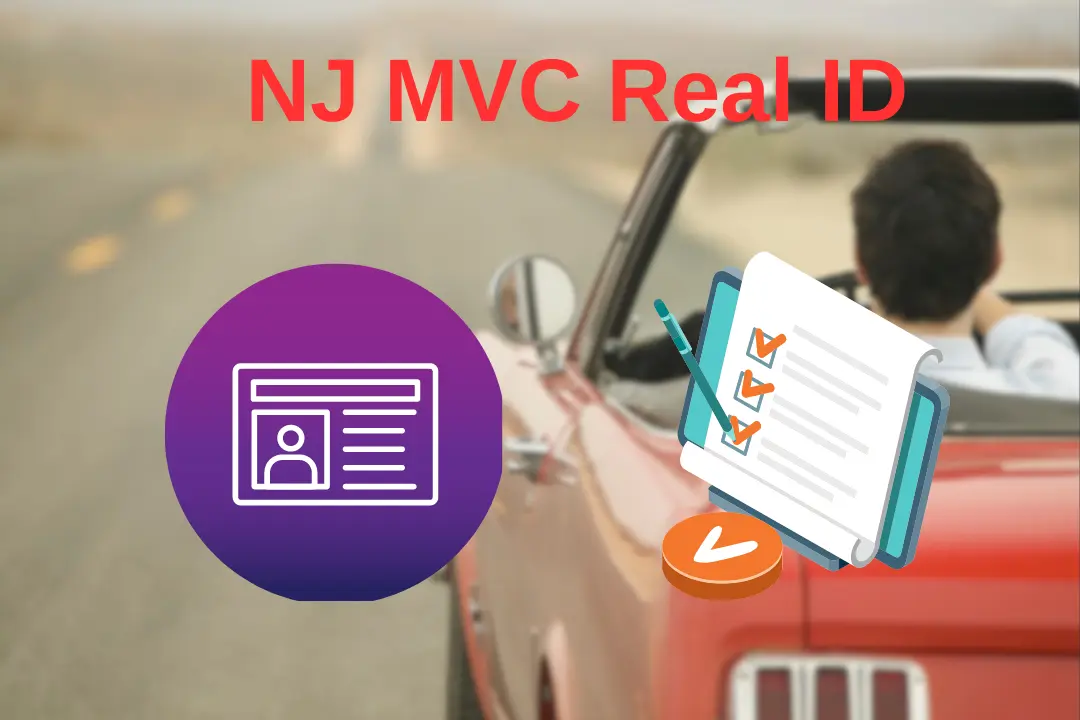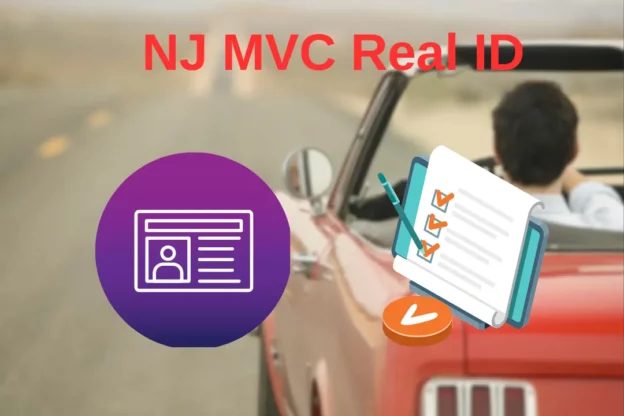What is NJ MVC Real ID?
The NJ MVC Real ID is a federally compliant driver’s license or identification card issued by the New Jersey Motor Vehicle Commission (NJ MVC). Beginning on May 7, 2025, individuals must have a REAL ID compliant driver’s license or ID to fly within the United States, unless they use a U.S. passport or another federally approved form of identification (source).
The purpose of the REAL ID is to establish minimum security standards for license issuance and production. It also prevents federal agencies, like the Transportation Security Administration (TSA), from accepting non-compliant IDs for accessing federal facilities or boarding domestic flights.
To obtain a NJ MVC REAL ID, applicants must provide several documents to establish their identity, lawful status, Social Security number, and proof of New Jersey residency. The process, known as the 6-Point Verification, consists of presenting various forms of identification that add up to six points.
Examples of documents that can be used for the 6-Point Verification include:
- U.S. birth certificate or passport
- Social Security card
- Proof of address, such as a recent utility bill, lease agreement, or mortgage statement
- Current NJ driver’s license or non-driver ID (if applicable)
These documents must be original or certified, and photocopies or electronic copies will not be accepted. It is essential to review the requirements and prepare the necessary documents before visiting an NJ MVC agency to apply for a REAL ID.
In summary, the NJ MVC REAL ID is a new form of identification required for specific federal purposes, such as air travel within the U.S. The 6-Point Verification is the process to verify the applicant’s identity and obtain a REAL ID compliant driver’s license or ID card.
Key Documents in 6-Point Verification
The 6-Point Verification system in New Jersey is designed to prevent identity theft and safeguard personal information. This process requires individuals applying for a driver’s license, non-driver identification card, or other related documents to provide specific documents to verify their identity.
One primary document is required to establish the applicant’s identity and date of birth. These primary documents include an original or certified copy of a birth certificate with a state or municipal seal or a US passport card confirming their citizenship. Foreign passports may also be accepted, provided they include accompanying INS or BCIS verification.
A secondary document is needed to verify additional aspects of the applicant’s identity. Examples of secondary documents are a current driver’s license, a Social Security card, or a school-issued photo ID. These documents must be originals or certified copies with the proper seals and cannot be photocopies or replicas.
In addition to primary and secondary documents, applicants must provide documentation to verify their Social Security number, such as a Social Security card or tax forms that display the number. If an applicant does not have a Social Security number, an Individual Taxpayer Identification Number (ITIN) or an affidavit stating the lack of SSN may be used.
The applicant also needs to prove their New Jersey residency using two documents that confirm their residential address. These could include a utility bill, a lease agreement, or a financial institution statement.
Overall, applicants must provide a combination of documents totaling six points from the categories specified by the New Jersey Motor Vehicle Commission. The points assigned to each document reflect their importance and authenticity, helping ensure a more secure and reliable process.
By adhering to the 6-Point Verification requirements, applicants can confidently confirm their identity, protecting themselves and their personal information from fraud and identity theft.
Do I need a NJ Real ID to renew my driver’s license?
The NJ Real ID is a type of driver’s license that is federally compliant and allows holders to board domestic flights or enter certain federal facilities without additional identification starting May 7, 2025. However, it is not mandatory for New Jersey residents to obtain a Real ID when renewing their driver’s license.
To renew a standard NJ driver’s license, most individuals are eligible for online renewal, and only a few cases may require visiting an agency in person. Not having a Real ID will not prevent someone from acquiring a renewed driver’s license, but it may restrict access to certain privileges, such as boarding domestic flights without additional identification, starting in 2023.
Those who want to obtain a Real ID when renewing their license must go through the 6-Point Verification process, which requires applicants to present various documents to prove their identity and New Jersey residency. This process includes presenting documents such as a valid NJ driver’s license, a utility bill or credit card statement, and a checking or savings account statement from a bank.

Purpose of Real ID 6-Point Verification
The 6-Point Verification is a system implemented by the New Jersey Motor Vehicle Commission (MVC) to establish a clear and stringent process for validating an individual’s identity. This verification method is necessary for obtaining state-issued documents such as a driver’s license, non-driver identification card, or boat license. The goal of the 6-Point Verification is to minimize the risk of fraud, identity theft, and unlawful use of driving privileges.
To comply with the 6 Points of ID requirements, applicants must provide various types of documents that, in combination, verify their full legal name, date of birth, Social Security number, and residency status in New Jersey. The MVC categorizes these documents into primary and secondary types, with each type assigned a specific point value. For a successful verification, the total point value of the submitted documents must equal or exceed six points.
Primary documents, which carry the highest point value, include documents such as birth certificates, US passports, foreign passports with valid immigration documents, and permanent resident cards. Secondary documents include items like marriage certificates, bank statements, and utility bills, which provide additional proof of identity and residency.
In addition to the 6-Point Verification, the MVC also offers the REAL ID, a new federally mandated identification card that meets increased security measures. As of May 7, 2025, the REAL ID will be required for individuals using their state-issued identification for domestic air travel or to access certain federal facilities. The process of obtaining the REAL ID involves providing the same documentation as the 6-Point Verification, but the requirements are slightly more stringent, ensuring a higher level of security and fraud prevention.
What’s the difference between an enhanced ID and a REAL ID in NJ?
The primary difference between an enhanced ID and a REAL ID in New Jersey is the federal recognition and security features. A REAL ID offers more security per federal requirements, thus allowing access to federal buildings and domestic air travel. On the other hand, an enhanced ID is state-issued and does not grant these privileges. The REAL ID is the new federal requirement for state-issued driver licenses and non-driver IDs to help prevent fraudulent identification.
Are passports and birth certificates part of the 6-Point ID system in NJ?
Yes, both passports and birth certificates are part of the 6-Point ID system in New Jersey. These documents are considered primary sources of identification and are worth 4 points each. The 6-Point ID verification system in New Jersey requires the individual to show at least one primary document and one secondary document to prove identity and date of birth.
What’s the cost of obtaining a NJ REAL ID?
New Jersey has not set a separate cost for obtaining a REAL ID. If you are renewing, the standard renewal fee applies. For a standard driver license, it costs $24, while for a non-driver ID, it would cost $11. If, however, you are upgrading outside your renewal time, you may need to pay an additional fee for the REAL ID. It is important to check the NJMVC website for the latest information on fees.
How can I schedule an appointment for a NJ REAL ID?
To schedule an appointment for a NJ REAL ID, visit the NJMVC’s scheduling webpage and follow the prompts. The website will allow you to select a date and time for your appointment, as well as the location of the Motor Vehicle Commission office. Make sure to bring the required documents, as outlined in New Jersey’s 6-Point ID verification system.
